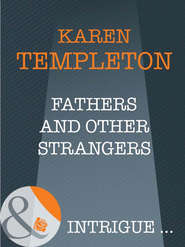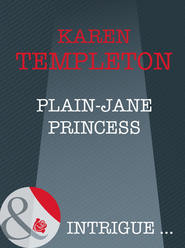По всем вопросам обращайтесь на: info@litportal.ru
(©) 2003-2024.
✖
Welcome Home, Cowboy
Автор
Год написания книги
2019
Настройки чтения
Размер шрифта
Высота строк
Поля
“I’m so sorry,” Cash repeated on a rough breath, the wind toying with the ragged ends of the hay-colored, shoulder-length hair visible beneath his cowboy hat. “More than I can say.”
“Yeah. Me, too.”
His jaw pulsing, he yanked open his car door. “I didn’t mean to intrude. I—” His fist slammed onto the roof. “Damn.”
A couple of the goats bleated, concerned. At Emma’s knees, Bumble let out a low growl.
“There’s coffee on,” she heard herself say, even as she thought, Please, God. No. “And pie. Peach. From the tree.”
Cash’s eyes swung to the lone peach tree down by the front fence. Between the altitude, the crazy northern New Mexico winter and Dwight Cochran’s neglect, it was a wonder the thing’d survived at all. Like the man in front of her, she thought on a slight intake of breath. Although the tree looked to be in far better shape than he was.
“Mr. Cochran?”
After a moment, he faced her, his famous silver eyes slightly unfocused. “Come on into the house. Until things settle a bit in your head.”
Bumble growled at him, louder this time, all Great Pyrenees machismo. Cash almost smiled. “You don’t want me here.”
“Wouldn’t be at the top of my list, no. But if you’re feeling a tenth of what I did when I suddenly found myself a widow a few months back, you’re in no fit condition to be driving back down that mountain.”
“I can manage—”
“Thank you, but I’m not up for taking that chance. And since my chores aren’t going away while we’re standing here, I suggest we move this conversation inside.”
* * *
Inside.
Cash glanced at the house. The memories leered. Then again, what had he expected?
Lee to be here, for starters. To buffer the pain of coming home, ease Cash through the worst of it. Like he’d always done. A stupid-ass assumption to begin with, considering how shredded things had become between them. How shredded Cash had let them get.
Now it was too late. For apologies, explanations, any of it.
“What’s to talk about?”
“Whatever led you here after all this time, I suppose.” At Cash’s hesitation, Emma said, almost sharply, “I promise you, there’s nothing in there that can hurt you anymore.” When his eyes snapped to hers, her mouth pulled tight. “Lee told me why you ran off. What your father did to you. Husbands share with their wives, Mr. Cochran,” she said to his glare. “Especially husbands trying to make sense out of why their best friend cut them off.”
“We were kids. We grew apart. I didn’t cut him off—”
“Oh, no? When Lee wrote to tell you about us getting the house, you never wrote back, never returned his calls, nothing. If that’s not cuttin’ somebody off, I don’t know what is.”
“And if you know about my father, I think it’d be perfectly obvious why I wasn’t exactly overcome with joy when I discovered Lee’d gotten buddy-buddy with the man who’d made my life a living hell—”
“Exactly what did my husband tell you? About why Dwight left us the house?”
Acid surged in Cash’s gut. “Only that some time after I left, he started working for the bastard. Helping out around the place, stuff like that.”
“And?”
“And, what? That was it.”
“Oh, Lord,” she muttered, then added, “We need to talk,” in a tone of voice that said there was more to the story. Half of him wasn’t sure he wanted to find out what that was, except.
Except if he’d come for answers, what difference did it make who he got them from?
His eyes touched hers. “How strong you make your coffee?”
“You won’t be disappointed,” Emma said, then set off toward the house. The dog gave him a Mess with her and you’re dead look, then plodded behind, only to collapse on the porch, completely ignoring Cash when he passed by.
Cash could only hope his father’s ghost would extend him the same courtesy.
“Who’s that?” Granny Annie barked at them from her “studio,” carved out of one corner of the cramped, perpetually cluttered living room. Cats, coffee cups, painting supplies, art magazines and haphazardly stacked vinyl LPs littered a conglomeration of tables and shelves; from a fifty-year-old hi-fi system, Ol’ Blue Eyes crooned loud enough to be heard in Wyoming.
“An old friend of Lee’s,” Emma yelled back, willing her pulse to settle down as she slapped her coat on the rack, then sloughed off Lee’s boots. A cat—The Red One, Emma couldn’t be bothered learning all their names, especially since half the time Annie couldn’t remember them, either—batted at the end of the scarf, dangling by Emma’s knees.
“Who?” Annie bellowed, clearly not wearing her hearing aids. Emma did not have the energy for that particular battle right now. Instead, she crossed to the record player and turned down the volume, surprised to find her hand still attached to her arm like normal, considering the recent, major hit to her entire molecular structure.
Man took intense to a whole new level. Like radioactive.
“You look familiar.” All bones and gumption, the old woman crept closer to their visitor, like a buzzard contemplating fresh carrion. A paint-spattered buzzard with dandelion-fluff hair in sore need of a perm. “Do I know you?”
“You used to, Granny Annie,” Cash said, taking her skeletal hand in his. “A long time ago. When Lee and I were kids. I’m Cash.”
Annie fiddled with her glasses, large-framed holdovers from the Reagan era. “Cash Cochran? Dwight’s youngest boy?”
“That’s right,” he said, pain flashing briefly in his eyes. “I was so sorry to hear about his passing—”
Annie snatched back her hand, looking like she might smack Cash with the brush. Deaf she might be, but Emma’d put her money on the old gal in a back-alley brawl any day. “He’s been gone how long now? And you’re only now showing up?” Her thin, wrinkled lips smashed flat, she inched back to the canvas to jab “leaves” on “trees.” “Everybody loved that boy. Everybody. Seems to me a friend would’ve at least come to his funeral—”
“He didn’t know, Annie. Really.” At Annie’s if-you-say-so shrug, Emma said to Cash, “Why don’t you help yourself to that coffee while I check on my daughter? She’s home from school with a cold, nothing serious. I’ll be right there.”
Then she hightailed it down the hall, stealing a few seconds to deal with the blow of discovering her husband had lied to her. Not to mention escape Cash’s eyes. Big, hurting eyes that made a woman want to get inside and tinker. Fix things.
Like she didn’t have enough to fix already.
Too bad she couldn’t lock up her nurturing instincts as easily as she had her libido. Between widowhood and being pregnant and the farm and everything else, all thoughts of hanky-panky had been shoved into a locked file drawer marked “Expired.” But her chronic attraction to the brokenhearted? To the grave, baby. To the grave.
She’d long since given up trying to figure out her penchant for the tired, the poor, the huddled masses yearning to break free of whatever put expressions like that on their faces. Lee had razzed her about it all the time, even as he said that was why he loved her, because her heart was even bigger than her butt.
A comment only Lee could have gotten away with, she mused, pausing outside Zoey’s door. Lee, who’d also always wanted to make everybody happy. Even if that meant—in his case—keeping one or more parties in the dark.
Leaving Emma with the tidying up.
Thinking, So what else is new? she finally peeked through Zoey’s partially open door into an explosion of sour-apple green and bubble-gum pink. A conglomeration of skinny appendages, freckles and wayward hair, her daughter was drawing, sprawled on the rag rug Annie’d made for her when she was a baby, in the same colors that had inspired the prissy color scheme. Beside her towered a mountain of used pink tissues, like blobs of cotton candy.
“How’re you doing, baby? And throw those tissues in the garbage.”
“They’re yucky.”











